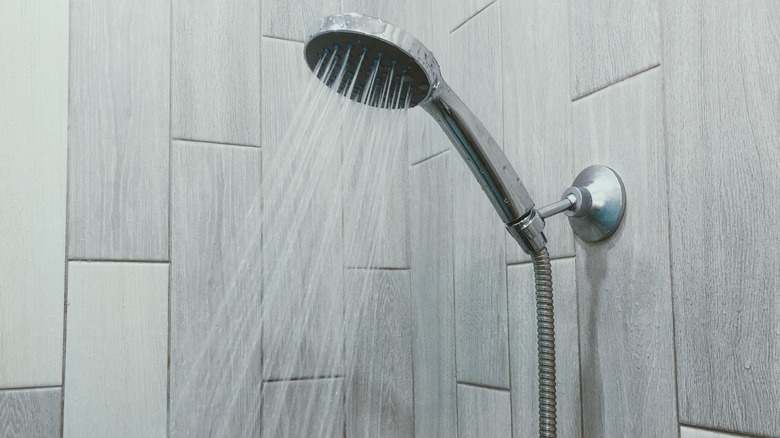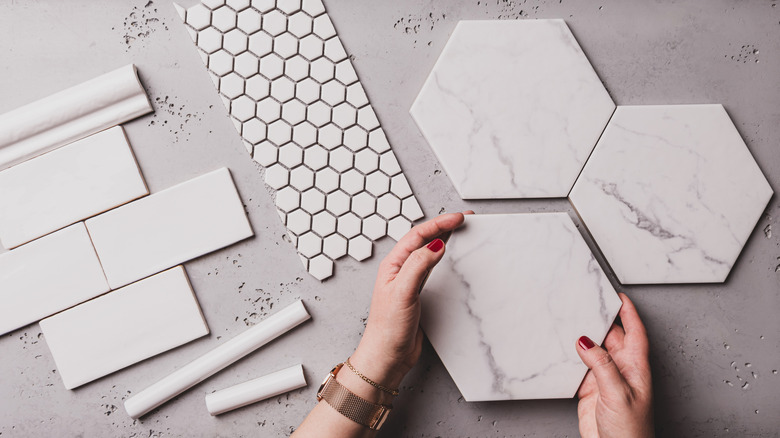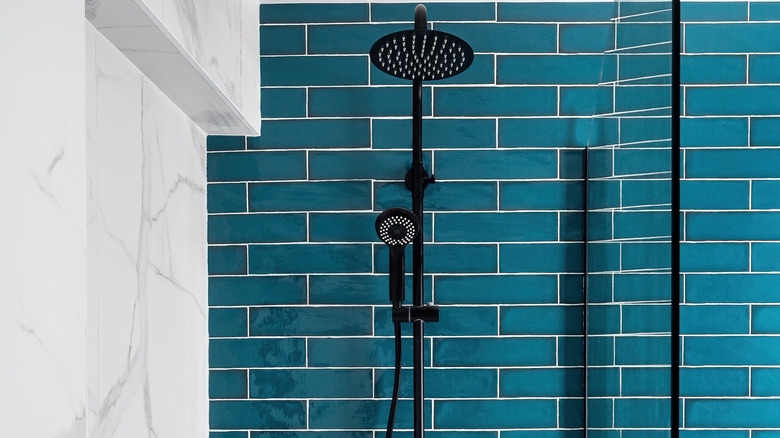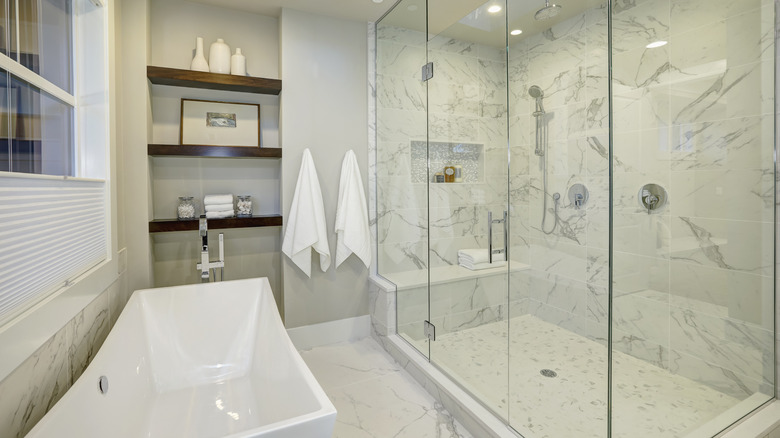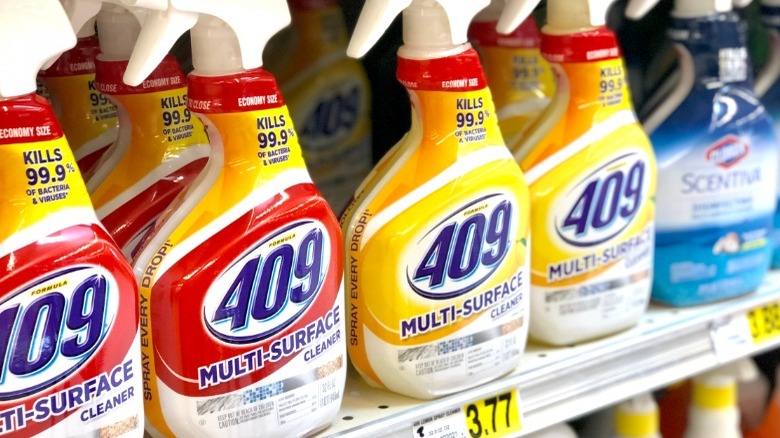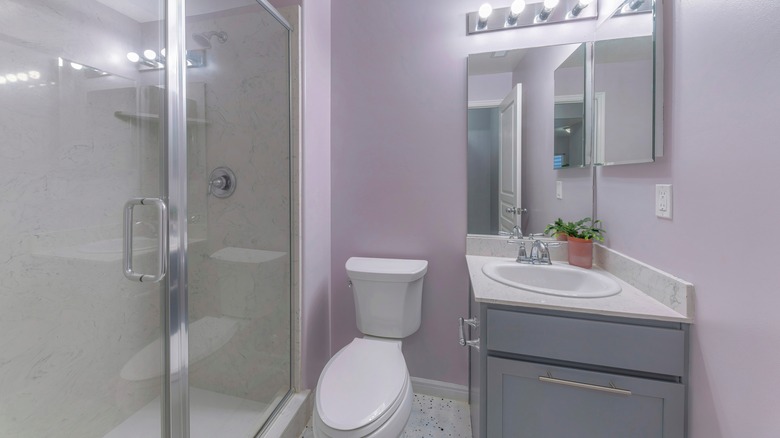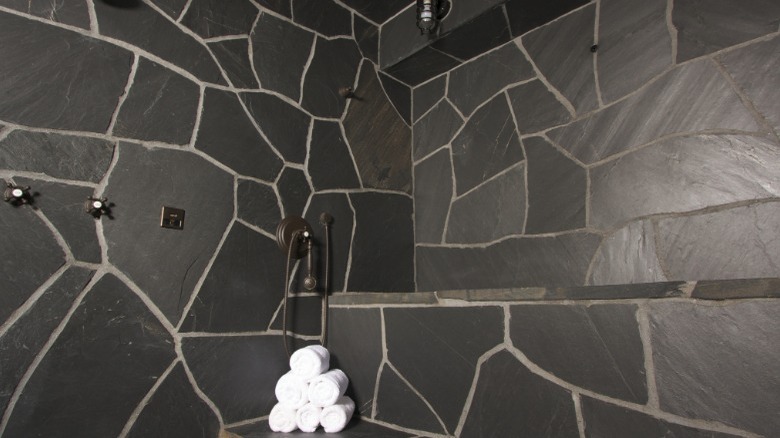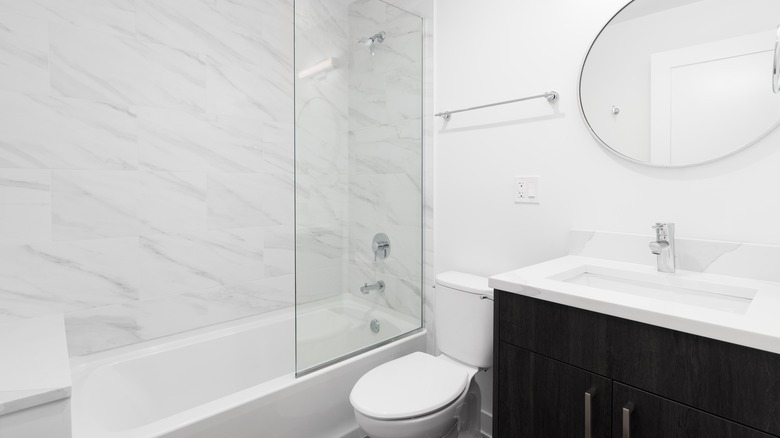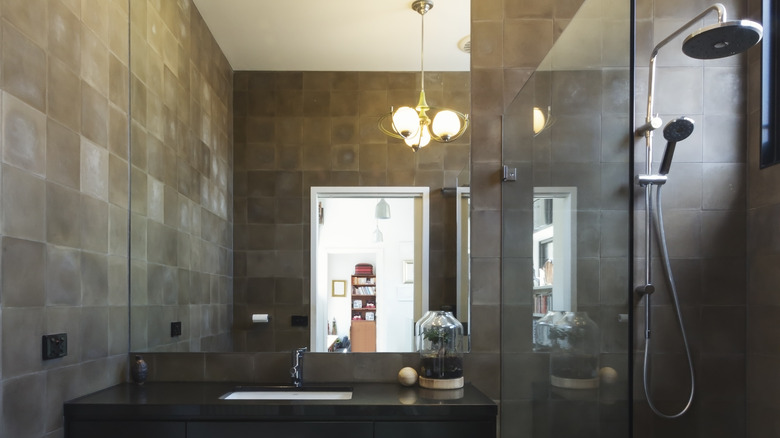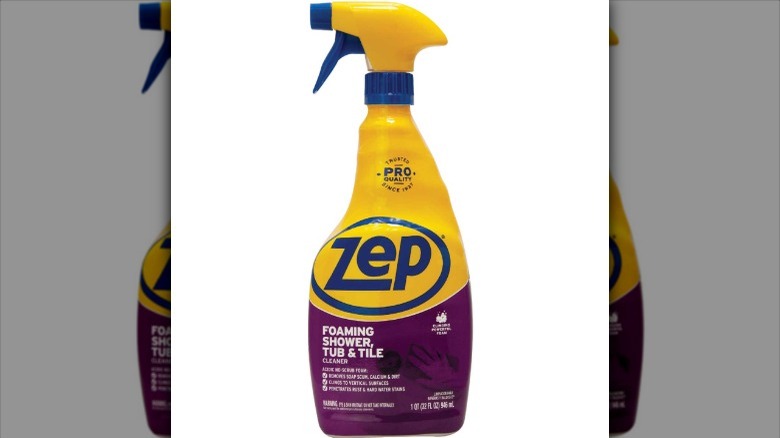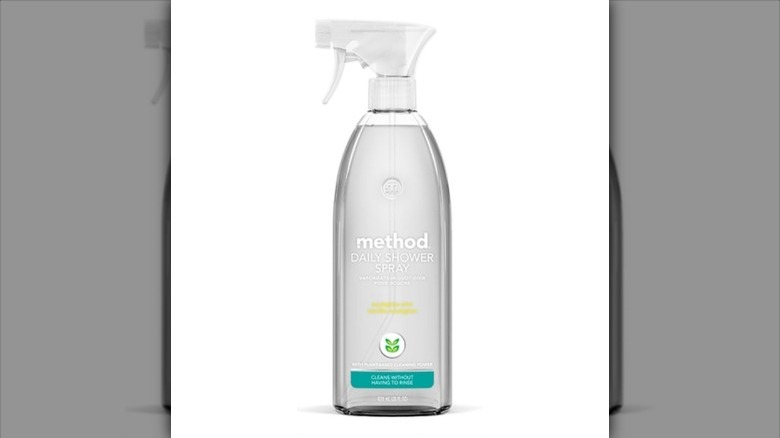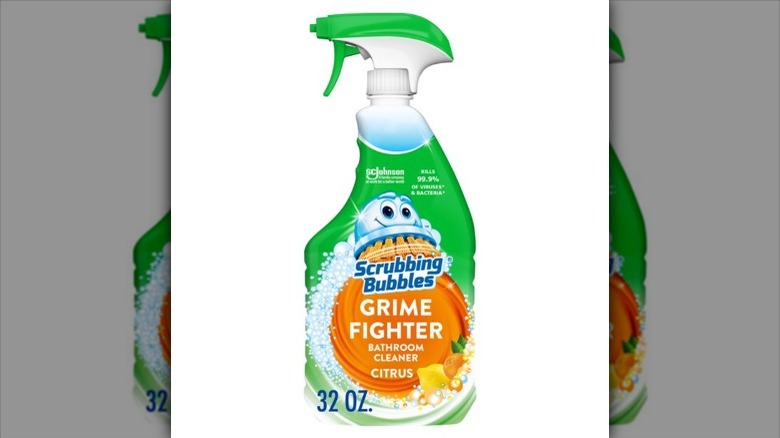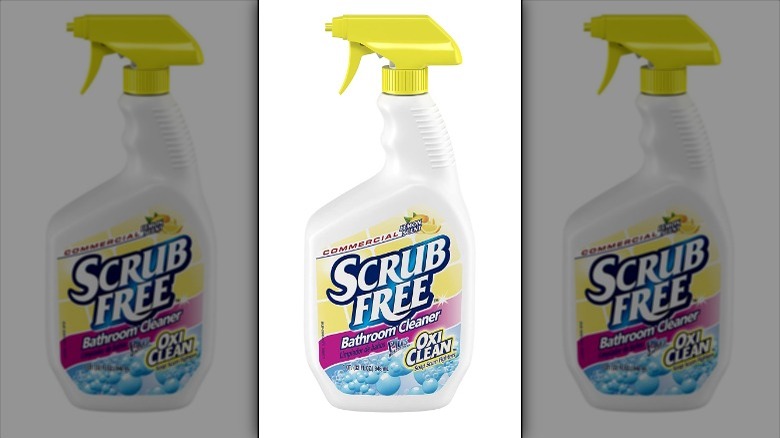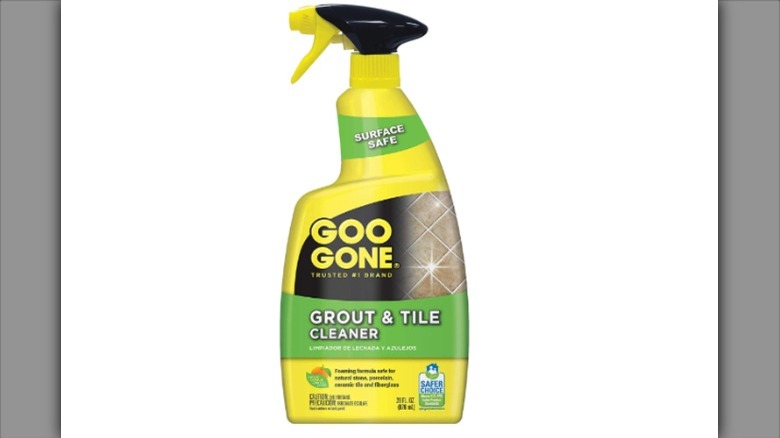The Best Shower Cleaners For Every Bathroom
We may receive a commission on purchases made from links.
The purpose of a shower is to get you clean, but if you are not conscientious, the walls, floors, and doors can get so cruddy that you won't even want to go in. Detail Cleaning Services goes over all the steps you need to take to make showers shine from top to bottom, and certain products and supplies make it much easier. This company recommends soaking the shower head in a sealed plastic bag filled with vinegar while you clean the shower walls and floor. Then, the shower head can be scrubbed with a brush to remove the mineral deposits. Some of the other best shower cleaning methods include tackling the grout with a baking soda and water paste, remembering to clean the door tracks, using a Magic Eraser on tough spots, working from top to bottom, and cleaning the floor last.
But when it comes to shower cleaners, one size does not fit all, particularly since the walls can be made from tiles, slabs, or sheets of material. Bath Fitter says ceramic tile is one the most popular materials for showers, but porcelain and stone tiles are also used. Other popular options are acrylic panels, fiberglass, and marble. Some of the best shower cleaners are made at home, but no matter what you use, avoid using ones made for stone on acrylic and so forth. Here is a breakdown of which cleaners are best for which tiles, and which products should be in your arsenal overall.
Ceramic tile showers
Rain City Maids warns that the wrong cleaning products can damage ceramic tiles, and advises using gentle formulas that can handle tough soap scum instead. It suggests filling up a spray bottle with a 50/50 mixture of vinegar and water, which can get sprayed onto the shower walls. If the shower is extra-nasty, turn on the hot water, close the door or curtain, and let it run for a few minutes; the steam will loosen the dirt and stains.
PROHousekeepers wipes down ceramic tiles with a microfiber cloth first; that can make things easier because dust and dirt are messier when wet. Use a brush or cloth to clean the tiles with your vinegar solution, then spray things down with the showerhead. Remove the water spots with a squeegee, and you're almost done. Now you can get out of the shower and use the same method to clean the floor.
If there's tough mold and mildew on the ceramic tiles, Clorox Plus Tilex Mold & Mildew Remover has bleach and doesn't require scrubbing. Home Depot reviewers gave it an average 4.7-star review, posting that they didn't have to use too much elbow grease and that the smell was not overly strong.
Porcelain tile showers
Porcelain and ceramic tiles are similar yet different. Tile America explains that while both are made from fired clay, porcelain contains feldspar and sand, so it's denser. Porcelain can also be glazed, is less likely to crack, and absorbs no more than 0.5% water. Routine cleaning is easy with warm water and mild soap, according to Daltile. You'll want to avoid harsh, acidic cleaning products that contain ammonia; use pH-neutral cleaners for unglazed porcelain. A multi-purpose spray cleaner should work on mildew soap scum, but you might need something stronger.
Don't clean porcelain tiles with vinegar since it is acidic (via International Wholesale Tile). It's also important to avoid abrasive cleaning tools like steel wool — nylon scrubbers are a safer choice. This source recommends slightly alkaline cleaning products made by brands like Mr. Clean. We like Mr. Clean Liquid All Purpose Cleaner, which you can find at Walmart. This got an average 4.7-star rating and can also be used on toilets, countertops, and hardwood floors.
Marble showers
Though marble is technically rock and looks pretty solid, it needs to be cleaned with TLC to prevent damage. Tile Club posts that marble mostly consists of calcium carbonate, so water penetrates beneath its surface. Marble also has iron deposits, so standing water can leave unsightly rust stains. Fortunately, marble showers can be sealed to prevent damage and discoloration.
Merry Maids posts that acidic cleaning products are not good for marble either, so don't use vinegar, lemon, or harsh cleaners. To maintain a marble shower's pristine appearance, wipe it down after each shower with microfiber towels to prevent hard water stains, mold, and soap scum buildup. You can clean the shower a few times a week or more (depending on how often it's used) with a spray bottle filled with warm water and a drop of mild dishwashing liquid.
CountertopSpecialty adds that harsh cleaning products can etch and dull marble surfaces, and discourages the use of hydrogen peroxide, citrus cleaners, and bleach on marble surfaces. Brand-name cleaners like Tilex, Lysol, and Windex can also be bad for marble, but commercial marble cleaning products can work when you need to remove stubborn stains. The Marble Cleaner recommends MarbleLife's Bathroom Cleaner Kit, which includes a spray bottle of marble/travertine cleaner, grout cleaner, and soap scum remover. It's manufactured by MB Stone, which sells 30 different products made specifically for marble.
Acrylic showers
This material is inexpensive and durable and, with the proper care, should last around 10 years, according to Elite Bathrooms LuxStone of Long Island. It is sold in sheets coated with glass and resin fibers for durability. Unlike marble, it is non-porous, so mold and mildew usually aren't a problem. Acrylic doesn't chip or crack that easily, either.
Cleaning solvents and store-bought aerosol cleaners are not good for acrylic showers, so you'll want to stick with a mild cleaning product and water. The best cleaning tools are soft ones, like non-textured sponges and microfiber cloths. Clean acrylic showers once a week for the best results.
Improveit Home Remodeling agrees that acrylic is water-resistant and can be cleaned with a vinegar and water solution. It also suggests using Formula 409 products on bathroom acrylic shower walls. Formula 409 Multi-Surface Cleaner Spray (original scent) is a good choice and has a 4.7-star rating on Walmart. This is a versatile cleaner that can be used on a variety of surfaces. The Formula 409 website's comparison chart shows that Formula 409 is safe for acrylic.
Fiberglass showers
According to Specialized Refinishing Company, fiberglass showers generally cost less than acrylic ones and are cleaned differently because they are made from polyester resin. Neither have seams, so either way, you won't have to worry about cleaning grout. Fiberglass shower walls can be wiped down with a clean, wet cloth and dried afterward, but you'll need more supplies for a deeper clean.
Home Made Simple steams up the shower and rinses it with hot water before a good cleaning. It advises against harsh cleaners and scrubbers; vinegar, water, and Dawn dish soap work just fine. You can also mix up a baking soda paste and work that into the fiberglass with a damp cloth. That will need to sit for about an hour, after which you can rinse it off. This source also likes Mr. Clean Clean Freak Deep Cleaning Mist for fiberglass showers. It's an all-purpose cleaner that can be applied and wiped off with a sponge or microfiber cloth. Mr. Clean Magic Eraser Bath also works on fiberglass and is great for removing soap scum and hard water stains.
Slate showers
This higher-end material comes in various colors and is used in showers more often than other kinds of natural stone, according to Kohler LuxStone. It can be harder to clean than other shower surfaces, though. All natural stone is porous, and these tiny pockets are perfect places for dirt and soap scum to accumulate.
If you'd prefer to make your own cleaner, wash the slate with a solution made from a pH-neutral dish soap and water. If you have stubborn buildup, clean the tiles with an equal mix of rubbing alcohol and water. However, if you'd like to use store-bought products, Integrity Stone & Tile Cleaning favors MB-9 Mildew Stain Remover for mold-stained slate showers. This can be used every two to four weeks, and the website claims it kills mold and smells on contact. It does not have to sit on the surface for a certain amount of time, so you can rinse it off immediately. You can also use products like MB-3 Soap & Mineral Deposit Remover if you struggle with hard water stains and need a little more cleaning power.
Granite showers
Granite is one of the most popular kitchen counter materials, but it's also a staple in bathrooms. Wholesale Granite Direct shares that granite showers can be made with custom-designed pieces in different shapes. The material is durable and resistant to damage when properly sealed. The main cons of granite showers are the higher cost and the need for routine resealing.
Fuller Stone Care advises consumers to wipe down granite showers after each use with a natural stone shower spray to reduce water spots. The spray can be removed with a squeegee when you're finished. If the shower walls are made from granite tiles, you'll need to clean the grout as well. Granite Gold shower cleaner is a great spray for this, which earned 4.7 stars from reviewers. It's pH-balanced and non-acidic, so you can use it on all natural stone surfaces. Use it to deep clean a granite shower; it also prevents mold and soap scum buildup, and won't leave unsightly streaks.
Soapstone showers
Soapstone can be a nice alternative to granite. M Teixeira Soapstone explains that this natural, dense stone consists of mostly talc and other minerals such as micas and quartz. It's used in countertops, sinks, and tiles. Real soapstone is resistant to heat, chemicals, and acids. It also is impervious to standing water and resists stains. Soapstone slabs can be cut to order like granite, and are also used to make shower pans. The latter doesn't get slippery because they aren't polished during the manufacturing process.
SimpleCoat posts that soapstone should not be cleaned with harsh cleaning tools or products, because they can damage the surface. Some people use mineral oil to clean soapstone, but it takes a lot of hard work to get the oil to penetrate below the surface. Instead, add a few drops of gentle dish soap into a bucket of warm water and clean the soapstone shower with that and a sponge; let it air dry or wipe it down with clean, soft cloths.
Another option is to clean soapstone with Comet or Ajax. Vermont Soapstone uses those on soapstone kitchen counters but also notes that soap and water work. This source does recommend a mineral oil treatment after the soapstone is installed because the extra moisture helps with oxidation. It also recommends sealing soapstone surfaces with The Real Milk Paint Company's 5-star rated Soapstone Sealer.
Zep Foaming Tub & Tile Bathroom Cleaner
If you like cleaners that bubble up, Zep Foaming Tub & Tile Bathroom Cleaner is one of the best ones available. This shower cleaner comes in a yellow-and-purple spray bottle and earned 4.3 stars. It can be used on most ceramic and porcelain tiles, acrylic, fiberglass, and cultured marble. You only need to spray it on and rinse it off; no scrubbing is required. It also has a nice smell and works on glass shower doors.
Lowe's shows that this Zep bathroom cleaner should not be used on natural stone, granite, or marble. One reviewer claimed it didn't spray like foam but was happy because it cut through a 20-year build-up of stains and gunk in her shower. Another (a professional housecleaner) used it to remove etching stains on porcelain tiles. She posted that Zep shouldn't be used on certain bathroom fixtures and encouraged readers to wear gloves when using it; she also liked the smell.
Method Daily Shower Spray Cleaner
Method Daily Shower Spray Cleaner is not a deep cleaner; it's used to prevent excessive stain buildup. It's easy to use because you simply spray it on the walls each time you finish taking a shower; using a squeegee is optional. It breaks down hard water residue, so weekly and monthly cleanings aren't as labor-intensive. Method cleaning products are geared toward people who prefer eco-friendly housecleaning products. The company's founders wanted to create safe, effective cleaning products that didn't harm people or the environment, so all of the brand's offerings are biodegradable and natural.
The Daily Shower Spray Cleaner earned a 5-star average review from DK Hardware and Home Depot. The latter claims that this spray cleaner works on tiles, showers, and fixtures. A Target brand expert wrote that the cleaner was safe to use on most non-porous surfaces (untreated natural stone is porous), but recommended testing a hidden area first.
Scrubbing Bubbles Bathroom Disinfectant Grime Fighter
Scrubbing Bubbles Bathroom Disinfectant Grime Fighter can be used to clean, deodorize, and disinfect glazed ceramic and porcelain tile, marble, glass, and shower doors, according to Scrubbing Bubbles. You just spray it on, give it five minutes to work, and wipe it off with a wet sponge or cloth. It also works on fiberglass and vinyl shower curtains, but should not be used on acrylic. The website claims this product eliminates 99.9% of viruses and bacteria, including salmonella, staph, and rotavirus.
Walmart users gave it 4.6 stars, and a few claim it's the only product they like to use to clean their bathroom, thanks to the fact it tackles difficult soap scum with minimal effort. No one likes to use muscle power when attacking shower walls, after all. Others have also commented on the fact that it doesn't smell like harsh chemicals, making the cleaning process more pleasant.
Scrub Free Bathroom Cleaner with OxiClean
Here's another reliable foaming bathroom cleaner — the Scrub Free Bathroom Cleaner with OxiClean. This cleaner is compatible with acrylic, fiberglass, ceramic and porcelain tile, plastic, and chrome. The OxiClean helps the foam penetrate through thick soap scum and remove hard water stains, and the cleaner is gentle enough to prevent scratches. CleanFreak adds that Scrub Free Bathroom Cleaner with OxiClean starts working immediately and doesn't require a lot of elbow grease.
Amazon sells an eight-pack of 32-ounce bottles of this cleaner and shows an average customer review rating of 4.5 stars. Some felt the lemon scent was a bit strong, but you can turn on a fan, wear a mask, or open a window if the fumes are bothersome. Aside from that, reviewers felt that this Scrub Free cleaner was fast and effective; you can spray it on, wait five minutes, and wipe it away.
Goo Gone Grout and Tile Cleaner
Before heading out, we thought it was important to include our choice for the best shower grout and tile cleaner: Goo Gone. Shower cleaners can work beautifully on tiles, acrylic, and stone, but sometimes grime, hard water, and mold accumulate in the joints. This cleaner can be used on ceramic and porcelain tiles, natural stone, and fiberglass. You only need to spray it onto the grout, let it sit for two minutes, scrub it with a soft bristle brush, and rinse. Best Views Reviews shows that Goo Gone Grout and Tile Cleaner works on hard water stains, soap scum, and mold. It analyzed 51 reviews, and there weren't any negative comments at all. This product earned an 8.1 out of 10 on this site.
But if you're using Goo Gone and another shower cleaner (store-bought or homemade), it's best to keep them separate. According to ABC27, mixing certain cleaning products together can be dangerous. It specifies that bleach and ammonia should never be used together, nor should bleach and vinegar, or hydrogen peroxide and vinegar.
